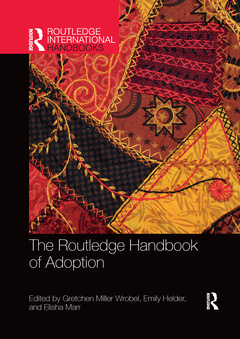The Routledge Handbook of Adoption Routledge International Handbooks Series
Coordonnateurs : Wrobel Gretchen Miller, Helder Emily, Marr Elisha

Adoption is practiced globally yielding a multidimensional area of study that cannot be characterized by a single movement or discipline. This handbook provides a central source of contemporary scholarship from a variety of disciplines with an international perspective and uses a multifaceted and interdisciplinary approach to ground adoption practices and activities in scientific research. Perspectives of birth/first parents, adoptive parents, and adopted persons are brought forth through a range of disciplinary and theoretical lenses.
Beginning with background and context of adoption, including sociocultural and political contexts, the handbook then addresses the diversity of adoptive families in terms of family forms, attitudes about adoption, and characteristics of adopted children. Next, research examining the lived experience of adoption for birth parents, adoptive parents, and adopted individuals is presented. A variety of outcomes for internationally and domestically adopted children and adoptive families is then discussed and the handbook concludes by addressing the development, training, and implementation of adoption competent clinical practice.
With cutting-edge research from top international scholars in a diversity of fields, The Routledge Handbook of Adoption should be considered essential reading for students, researchers, and practitioners across the fields of social work, sociology, psychology, medicine, family science, education, and demography.
Interviews with chapter authors can be accessed as podcasts (https://anchor.fm/emily-helder) or as videos (https://bit.ly/2FIoi0a).
Part I: Adoption in context
1. Historical and contemporary contexts of US adoption: an overview
2. US adoption by the numbers
3. An economic perspective on ethics in adoption policy
4. Domestic adoption in Ethiopia
5. Intersection of information science and crisis pregnancy decision-making
6. Respecting children’s relationships and identities in adoption
7. The Early Growth and Development Study: using an adoption design to understand family influences and child development
Part II: Diversity in adoption
8. Unique challenges and strengths for families formed through international adoption
9. A critical adoption studies and Asian Americanist integrative perspective on the psychology of Korean adoption
10. A nationally representative comparison of Black and White adoptive parents of Black adoptees
11. Racial and gender preferences among potential adoptive parents
12. Adoptive families headed by LGBTQ parents.
13. Post-institutionalized adopted children: effects of prolonged institutionalization and adoption at an older age
14. Adoptees with disabilities or medically involved children: a multidisciplinary approach for preparing parents, assessing the child, and supporting successful family formation
15. Adoption in the context of natural disaster
Part III: Lived experience
16. Birth mothers’ options counseling and relinquishment experiences
17. Transracial adoptees: the rewards and challenges of searching for their birth families
18. Communication about adoption in families
19. Open adoption
20. How adoptive parents think about their role as parents
21. Religiosity and adoption
22. Adoptive microaggressions: historical foundations, current research, and practical implications
23. Maltreatment of adoptees in adoptive homes
Part IV: Outcomes
24. Speech and language development in adopted children
25. Behavioral and emotional adjustment in adoptees
26. The neurobiological embedding of early social deprivation in children exposed to institutional rearing
27. Post-adoption short- and long-term social adaptation and competence of internationally adopted children
28. Academic performance and school adjustment of internationally adopted children in Norway.
29. Parenting stress in adoptive families
30. Adoption instability, adoption breakdown
Part V: Adoption Competency
31. Adoption competent clinical practice
32. Training for Adoption Competency curriculum
33. Awareness of adoption at school
34. Post-adoption se
Gretchen Miller Wrobel, Ph.D., is the University Professor of Psychology at Bethel University, USA and co-investigator on the Minnesota-Texas Adoption Research Project. Dr. Wrobel’s research interests include information seeking related to curiosity about one’s adoption and adoptive family communication. She is past editor of Adoption Quarterly.
Emily Helder, Ph.D., is an Associate Professor of Psychology at Calvin University, USA. Dr. Helder is a clinical neuropsychologist whose research and training have focused on the impact of early experience on later development, language, and the experience of abuse, neglect, and early deprivation.
Elisha Marr, Ph.D., is an Associate Professor of Sociology and Director of Gender Studies at Calvin University, USA. Dr. Marr’s research on transracial adoption includes identifying trends in adoption rates, experiences of transracial adoptees and their adoptive parents, and racial preferences of adoptive parents. More recently, Marr has expanded to exploring motivations to adopt.
Date de parution : 09-2021
17.4x24.6 cm
Date de parution : 03-2020
17.4x24.6 cm
Thème de The Routledge Handbook of Adoption :
Mots-clés :
Adoption Kinship Network; Adoption Triad Members; Domestic Private Adoptions; Adoptive Identity Development; LGBTQ Parent; Intercountry Adoption; Pre-adoption Adversity; Inter-country Adoption; Transracial Adoption; Adoptive Families; Reactive Attachment Disorder; Birth Parents; International Adoption; Birth Family Members; Prospective Adoptive Parents; Non-adopted Children; Domestic Adoption; Adoption Triad; Adoptive Identity; White Adoptive Parents; Birth Mothers; Korean Adoption; Open Adoption; Adoption Professionals; International TRAs



